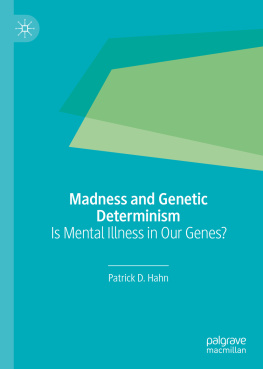Behaving
Behaving
Whats Genetic, Whats Not, and Why Should We Care?
KENNETH F. SCHAFFNER


Oxford University Press is a department of the University of Oxford. It furthers the Universitys objective of excellence in research, scholarship, and education by publishing worldwide.Oxford is a registered trade mark of Oxford University Press in the UK and certain other countries.
Published in the United States of America by Oxford University Press
198 Madison Avenue, New York, NY 10016, United States of America.
Oxford University Press 2016
First Edition published in 2016
All rights reserved. No part of this publication may be reproduced, stored in a retrieval system, or transmitted, in any form or by any means, without the prior permission in writing of Oxford University Press, or as expressly permitted by law, by license, or under terms agreed with the appropriate reproduction rights organization. Inquiries concerning reproduction outside the scope of the above should be sent to the Rights Department, Oxford University Press, at the address above.
You must not circulate this work in any other form and you must impose this same condition on any acquirer.
Library of Congress Cataloging-in-Publication Data
Names: Schaffner, Kenneth F.
Title: Behaving : whats genetic, whats not, and why should we care? / Kenneth F. Schaffner.
Description: New York, NY : Oxford University Press, 2016. | Includes index.
Identifiers: LCCN 2015027801 | ISBN 9780195171402 (hardcover : alk. paper) | eISBN 9780190631604
Subjects: LCSH: Behavior genetics. | Nature and nurture.
Classification: LCC QH457 .S33 2016 | DDC 591.5dc23 LC record available at http://lccn.loc.gov/2015027801
For some special people with whom I share genes and environment: Jeanette, Gabrielle, Laura, Michela, and Nancy
CONTENTS
FIGURES
TABLES
I conceived of this book in 2001. In the years 20002003 I was assisting with a project entitled Tools for a Public Conversation about Behavioral Genetics directed by the Hastings Center (HC), the major institution examining bioethics in the United States, working jointly with the American Association for the Advancement of Science (AAAS). (More information on the project can be found in of this book.) Several members of the project, including one of the principal investigators, asked me if there was any history or general philosophical introduction to human behavioral genetics. A search at that time indicated none existed, and I began to plan to write one. I received major support for the intended book from the National Science Foundation (via grants 9618229, 0324367, 0628825, and 0958270), as well as support from the NIH via the HC-AAAS Ethical, Legal, and Social Implications (ELSI) grant (R01 HG001873-03). Important earlier support for my research into schizophrenia was provided by the Greenwall Foundation. I am also grateful to both Donald Lehman, former Vice President for Academic Affairs at The George Washington University, and Dean N. John Cooper at the University of Pittsburgh for providing me with sabbaticals and research leaves during which the research for this book was pursued.
This book, and a successor book that plans to look more closely at the behavioral genetic issues in IQ and aggression/criminality studies, required that I talk to numerous contributors and critics of behavioral genetics. Those interviewsvirtually all of them audio recordedtook place from 2003 through 2011. I am indebted to those many investigators who took the time to review and explain their work. They included Dean Hamer, David Reiss, David Goldman, Charles Murray, Kenneth Kendler, Michael Neale, Lyndon Eaves, Eric Turkheimer, Lee Ehrman, L. (Niki) Erlenmeyer-Kimling, Ming Tsuang, Richard Lewontin, Jon Beckwith, Diane Paul, Bernie Devlin, Michael Pogue-Geile, Karoly Mirnics, Irwin Waldman, Robert Cloninger, John Rice, Gar Allan, Elving Anderson, Tom Bouchard, Irving Gottesman, David Lykken, Matt McGue, Nick Martin, Greg Carey, John DeVries, John Hewitt, John Loehlin, Marc Feldman, Arthur Jensen, Neil Risch, Luigi Luca Cavalli-Sforza, Gardner Lindsay, Robert Plomin, Michael Rutter, Peter McGuffin, Terrie Moffitt, Steven Rose; Dorret Boomsma, Nancy Pedersen, Leon Kamin, and Daniel Weinberger.
. Beginning in the mid-1990s, I began a two-decades-long set of discussions and meetings with Irv Gottesman, Eric Turkheimer, Don Linszen, and Ken Kendler. Over the years, each of them has expertly and patiently guided me through the thickets of behavioral and psychiatric genetics. I also want to thank Juan Mezzich for inviting me to several major meetings to discuss the nature of psychiatric disorders and validity, including a foundational meeting of the committee on the International Classification of Diseases (ICD) mental disorders section in Toulouse, France, in 2005. I am also grateful for my colleagues and graduate students who were willing to read earlier draft chapters of this manuscript and offer comments on it. Among these, in addition to those mentioned in the list of interviewees above, were my Pitt colleagues Jim Bogen, Peter Machamer, Edouard Machery, Sandra Mitchell, and Jim Woodward; also Lindley Darden and Ilya Farber from my GWU and DC days, and more recently in Copenhagen Josef Parnas. I have had many discussions about these topics in these chapters with graduate students including Carl Craver, Thomas Cunningham, Lauren Ross, Kathryn Tabb, James Tabery and with Philosophy of Science Center postdocs and fellows Maria Kronfeldner, Marta Bertolaso, Marie Darrason, Serife Tekin, Carrie Figdor, and Bill Bechtel, as well as at conferences with Alex Rosenberg, Sahotra Sarkar, Jon Tsou, and Evert van Leeuwen. Finally, I am most grateful to my family members, to whom this book is dedicated.
By the end of 2005, when I returned to the University of Pittsburgh, I had a reasonably complete draft of these book chapters. But then the period 2006 until now coincided with a virtual revolution in behavioral and psychiatric genetics. As new and unsettling results from genome-wide association studies (GWAS) began to appear, those methods were applied to behavioral genetics, and heightened standards of replication were developed. The story of the effects of GWAS and increased replication standards on this field, and on its close relation, psychiatric genetics, is told in a number of the chapters below, especially in 2, 6, and 7. GWAS (and now its related method of genome-wide complex trait analysis [GCTA]) thus required much of the books manuscript to be recast and rewritten. More recently, the evolving DSM-5 process required changes in this text during 20122013, especially in will continue to occur, I think we are now on a methodological plateau, and that the analyses and conclusions about behavioral and psychiatric genetics presented here will be most useful for philosophers, historians, and scientists.
Last, I gratefully acknowledge that in this book I draw on parts of articles that I have published previously, though all those parts have been modified and updated to reflect more recent developments in the fields of behavioral and psychiatric genetics, as well as in the philosophy of science. As noted above, in their original form
Behaving
examine criticisms of some traditional standard views of behavioral genetics, and do so by making use of what we have learned about the simplest biological system with a neural network,











